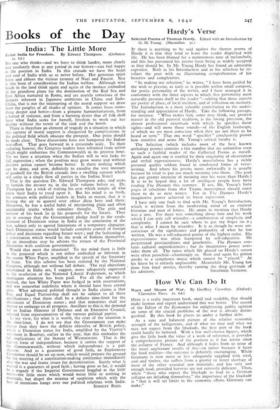Hardy's Verse
IF there is anything to be said against the shorter poems of Hardy it is that they tend to leave the reader dispirited with
life. He has been blamed for a monotonous note of melancholy, and this has prevented his poems from being as widely accepted as they should be. In Mr. Young Hardy has found an admirable expositor. Both in his Introduction and in his selection he re- values the poet with an illuminating comprehension of his beauties and complexities.
" In making my selection," he writes, " I have been guided by the wish to present, as truly as is possible within small compass, the poetic personality of the writer, and I have arranged it in conformity with the three aspects in which that personality most naturally presents itself to the reader "—adding that those aspects are poetry of place, of local incident, and of reflection on memory.
The Introduction is a most valuable contribution to the under- standing and appreciation of Hardy. Take the following passage, for instance. " What makes him, some may think, our greatest master in the old pastoral tradition, is the loving precision, the almost professional exactitude with which he specifics those sights—and still more those sounds—of the English landscape, of which we are most conscious when they are not there to be heard or seen." That one word " specifies " conclusively proves how sensitive and acute Mr. Young's critical faculty is.
The Selection (which includes most of the best known anthology poems) contains a fair number that are unfamiliar even to such a faithful reader of the Collected Poems as myself. Again and again one is startled by their originality of observation and verbal expressiveness. Hardy's musefulness has a richly personal quality seldom found in condensed forms of verse- writing. And where his poems move awkwardly it is usually because he tried to put too much meaning into them. (No poet has put greater intensity of meaning into his verse than •Hardy.) It is to be hoped that a lot of intelligent people have been reading The Dynasts this summer. If not, Mr. Young's forty pages of selections from that Titanic masterpiece should cause them to do so next winter. For in The Dynasts Hardy's imaginative power achieved its freest expression.
I have only one fault to find with Mr. Young's Introduction, which is written from the moderating mind of an eminent historian and man of letters. He omits to mention that Hardy was a seer. For there was something about him and his work which I can only call wizardry—a combination of simplicity and complexity. I cannot be sure where to put my finger on it ; that is what I mean by wizardry. It is as though he were un- conscious of the significance and profundity of what he has written. He was a self-educated genius of the highest order. His expressiveness was often hampered by self-education. He perpetrated provincialisms and gaucheries. The Dynasts con- tains cultural unproficiencies ; but its imaginative power over- rides them all. The tunes which life played on Hardy's senses were often parochial—charmingly so. Now and again his genius awoke to a symphonic music which cannot be " placed." At his finest he is entirely unplaceable. Meanwhile Mr. Young has done him loyal service, thereby earning the deep gratitude of


























 Previous page
Previous page